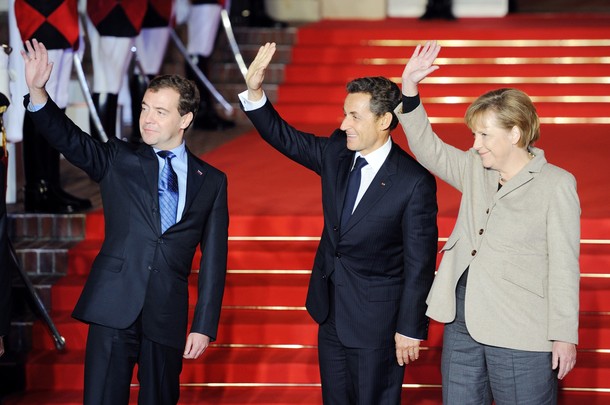
From John Vinocur, the International Herald Tribune: Germany and France, meeting with Russia in Deauville, northern France, last week, signaled that they planned to make such three-cornered get-togethers on international foreign policy and security matters routine , and even extend them to inviting other “partners” — pointing, according to diplomats from two countries, to Turkey becoming a future participant.
That can look like an effort to deal with European security concerns in a manner that keeps NATO, at least in part, at a distance. And it could seem a formula making it easier for Russia to play off — absolutely no novelty here — the European allies against the United States, or NATO and the European Union, against one another.
But there’s more detail in the theoretical Euro-Atlantic apostasy department: Add Chancellor Angela Merkel’s proposal, made in June, that the European Union and Russia establish their own Political and Security Committee, and President Nicolas Sarkozy’s intention, enunciated in Deauville, to establish an E.U.-Russia economic space “with common security concepts. …”
At the same time, the U.S. reset with Russia and the administration’s willingness to treat President Dmitri A. Medvedev as a potential Western-oriented partner has given the Germans and French the sense they were free to act on the basis of their own interpretations of the changes in Moscow.
In this European view, the United States has become significantly dependent on Russia through its maintenance of military supply routes to Afghanistan and its heightened pressure, albeit in wavering measure, on Iran. Because the reset is portrayed by the administration to be a U.S. foreign policy success, criticism from Washington of Russia is at a minimum.
Consider this irony: the more Russia makes entry into the E.U.’s decision-making processes on security issues a seeming condition for deals the French and/or Germans want (think, for example, of France’s proposed sale to Moscow of Mistral attack vessels), the more the impression takes hold that the administration’s focus for complaint about the situation has been off-loaded onto the Europeans.
Example: Ivo H. Daalder, the United States’ permanent representative at NATO, gave a speech in Paris last week in which he skipped over the Russians’ maneuvering, but described as “baffling” and “very strange” that “NATO doesn’t have a real strategic partnership with the E.U.”
True enough. On the other hand, Russia is getting a whole series of passes: Ten days ago, when Mr. Medvedev offered Hugo Chávez of Venezuela help to build the country’s first nuclear power station, the State Department expressed concern about technology migrating to “countries that should not have that technology” — but added (bafflingly), that the relationship between Venezuela and Russia (for years Iran’s supplier of nuclear wherewithal) “is not of concern to us.” (photo: Getty)
Image: getty%2010%2026%2010%20merkel%20sarkozy%20medvedev.jpg
